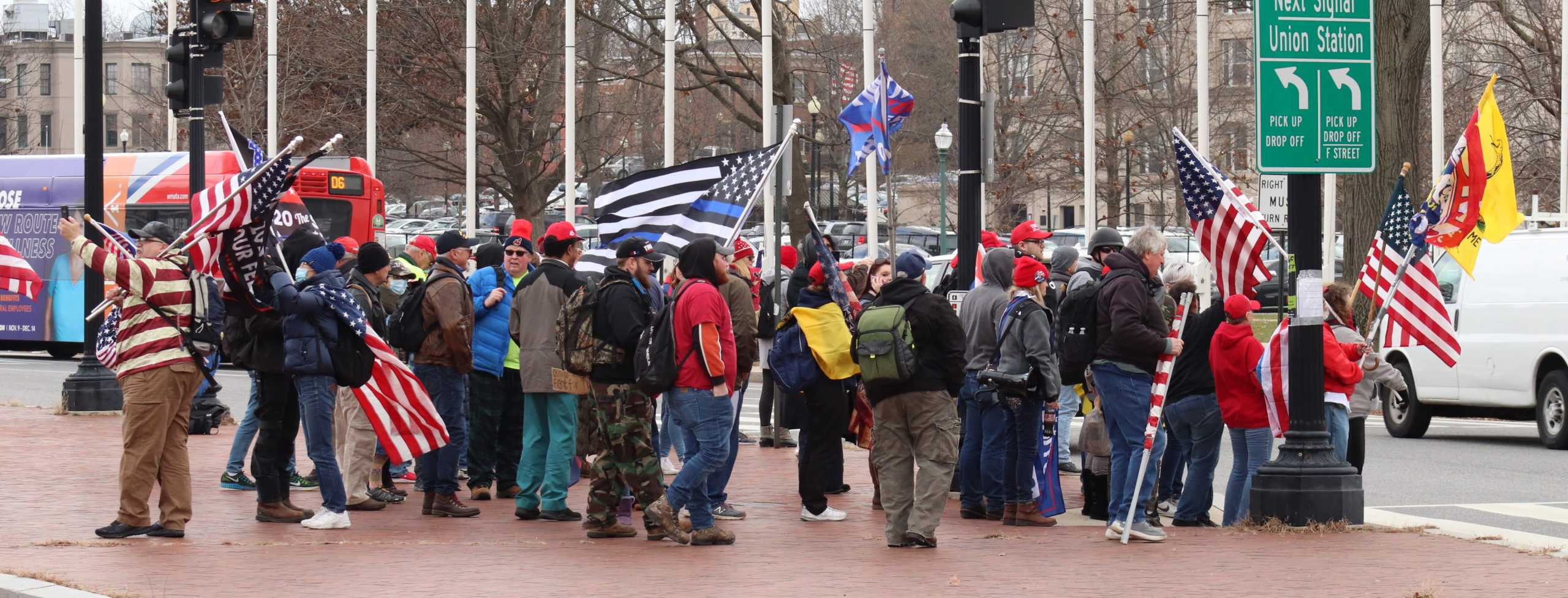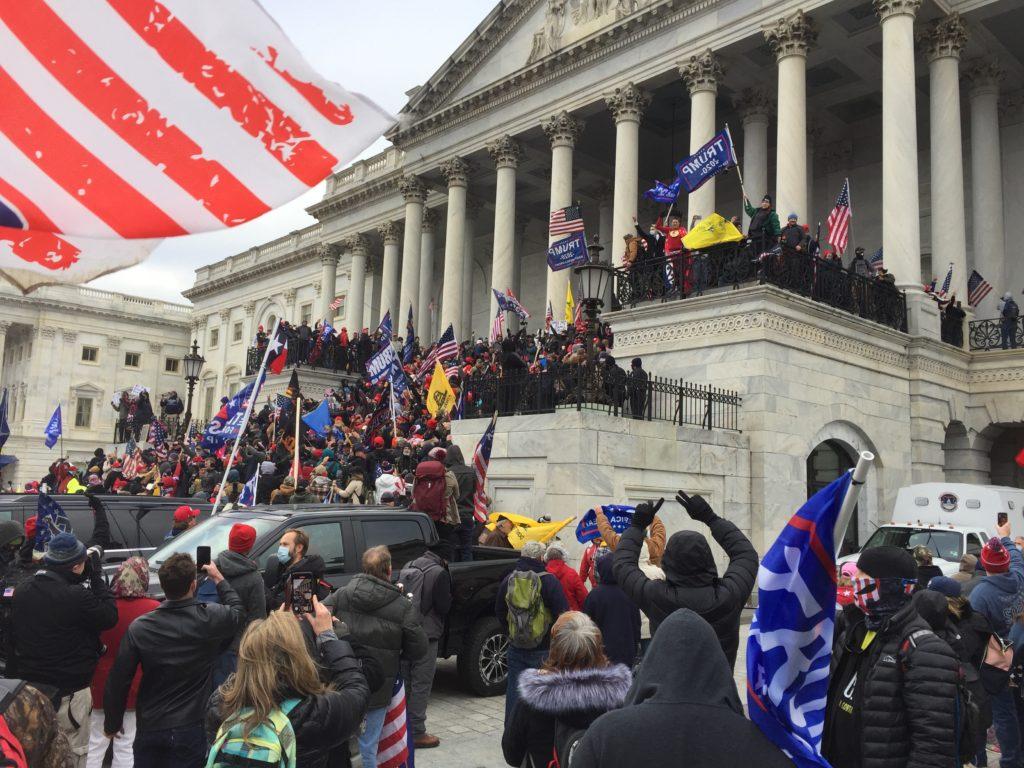By Dylan Caine
A month ago, our sights were first drawn in horror to the putsch on the Capitol ramparts. In what would become an unbridled humiliation for the Republic, the traitorous battle flag, forever absent from our democratic chambers, was waved alongside the paths of marauding hooligans inspired by the former president. His conspiratorial fetishism brought this nation face to face with a hellish debauchery that injured the spirit of so many Americans anew. Not only did minoritized communities suffer through watching the sight of avowed insurrectionists and white supremacists marching through the halls of our Capitol with revelry, but Jewish-Americans, in particular, were vexed at the propensity of the rioters towards issuing violently Antisemitic threats and slogans. Such actions paralleled those seen in the ghettos of the Old World, but rarely witnessed along our nation’s hollowed corridors.
At the beginning of the Jan. 6 demonstrations, U.S. Congresswoman Mary Miller inaugurated the day by exclaiming that “Hitler was right on one thing,” shortly before the raiders breached the Capitol. Among others, this crowd included a pillager wearing a “Camp Auschwitz: Staff” sweatshirt — mocking the nearly 1,000,000 Jews and 100,000 other persons murdered by Nazis and their collaborators in the extermination camp’s gas chambers during the Holocaust. From this and other utterances, it was clear that explicit exhibitions of Antisemitism would constitute an essential feature of the ill-fated day. With the 2017 Unite the Right Rally in Charlottesville, Virginia able to serve as precedent — during which white supremacists infamously chanted “Jews will not replace us” and murdered counter-protester Heather Heyer — Jews have been consistently reminded in recent years of their conditional and incomplete acceptance into the American milieu.

This, of course, is not a new observation, but rather constitutes the culmination of the past half-decade, in which the number and severity of Antisemitic incidents have consistently reached unprecedented heights. Among the worst incidents, the white supremacist murders of 11 congregants at the Tree of Life Synagogue in Pittsburgh and of Lori Gilbert-Kaye at the Chabad Synagogue of Poway have been firmly etched into the American Jewish consciousness. Only a few months after the latter attack, four were murdered at a Jersey City kosher market by assailants affiliated with the so-called “Black Hebrew Israelites,” a Southern Poverty Law Center-designated hate group. Shortly thereafter, another murder spree took place at a Hanukah party in nearby Monsey, New York, which claimed the life of 72-year old Rabbi Josef Neumann. All of this, in turn, has come in the face of years-long waves of assaults against Orthodox Jews in Brooklyn, where local attackers often appear to exact anti-Jewish violence with impunity. While one could go on, it is clear that our fractured society, which increasingly cultivates Antisemitic delusions like the Soros-caravan conspiracies and QAnon — while also turning a blind eye to hateful incitement perpetrated behind the fig leaf of progressive activism — will be one that threatens the lives of Jews and the members of other minoritized communities for some time to come.
That said, there are moments in this period of transition away from four years of resurgent racist, Antisemitic and Islamophobic politicking that should leave us with a profound sense of satisfaction, if not hope, at our nation’s ability to reach past those that would seek to halt the rise of this New America from taking shape. The dual election of Rev. Raphael Warnock and Jon Ossoff to the United States Senate as Georgia’s first Black and Jewish representatives, respectively, in the chamber constitutes an overwhelming triumph for the deep Southern state. Given that Georgia has long been better known as a home to the murderers of Leo Frank, the Jewish factory manager who was lynched 105 years prior, and the Ku Klux Klan acolytes of Stone Mountain, this accomplishment should be viewed as nothing short of remarkable.
All the more spectacular has been Warnock and Ossoff’s warm allyship, which was placed front and center throughout their campaigns. Among its many highlights was the collaboration of Warnock’s Ebenezer Baptist Church, the historic pulpit of Dr. King, and Ossoff’s Atlanta synagogue. The Temple, as the latter is affectionately known, was itself bombed by the “Confederate Underground” in 1958 on account of its Rabbi Jacob Rothschild’s vocal support for the Civil Rights movement. On the coattails of this history, Senator Warnock and Senator Ossoff’s elevation to our nation’s highest legislative body constitutes a renewed and exciting chapter in the story of expanding American opportunity. It is one that is made possible by trailblazers willing to sacrifice tremendously in support of the fundamental dignity of their fellow woman, person and man.
Though the ushering in of the Biden Administration offers a profound sense of relief for many after four long years of escalating assaults on any community that did not strictly toe the MAGA line, it would be foolish to see our work, as Jews or members of other minoritized communities, as anything close to being done. The murder of George Floyd this summer and the countless peaceful demonstrations that followed — which rightfully demanded accountability for violent, systemic police misconduct and the public affirmation of Black lives, in policy, by our elected officials — underscores the challenges that await Americans who would like to merely wish the Trump-era’s outspoken racism away. Rather, it is incumbent on all, including those of us in minoritized communities, to actively contribute to the renewal of a societal covenant that upholds the inherent worth of every individual.
It is one that is made possible by trailblazers willing to sacrifice tremendously in support of the fundamental dignity of their fellow woman, person and man. -Dylan Caine
Among factions with competing understandings of communal protection and safety, it cannot be said that a Jew, such as myself, or a member of another minoritized community, will necessarily find every organizing space equally welcoming. Yet, the retention of unjust societal institutions that continue to encroach into the lives of Black and other minoritized citizens in this country requires our full participation in the business of ameliorating systemic racism’s persistent violence and daily harms in whichever manner we can. Whether one is an activist, organizer, clergy member, policymaker, academic, lawyer or concerned citizen, everyone has a role to play in transforming our society into one that affirms the unquestionable dignity of every human being. It is in this spirit that refugee and Civil Rights activist Rabbi Abraham Joshua Heschel left his listeners at the 1963 National Conference on Religion and Race with the choice between the poison of race and the affirmation of the divine blessing in upholding life:
“Shortly before he died, Moses spoke to his people. ‘I call heaven and earth to witness against you this day: I have put before you life and death, blessing and curse. Choose life’ (Deuteronomy 30:19). The aim of this conference is first of all to state clearly the stark alternative. I call heaven and earth to witness against you this day: I have set before you religion and race, life and death, blessing and curse. Choose life.”
Grinnellians, our choice is clear. To establish a better future tomorrow, the holy mission to bury the shackles of race must be incumbent on us all. Choose life.
Dylan Caine is a fourth-year student at Grinnell College and a member of Chalutzim.




























































